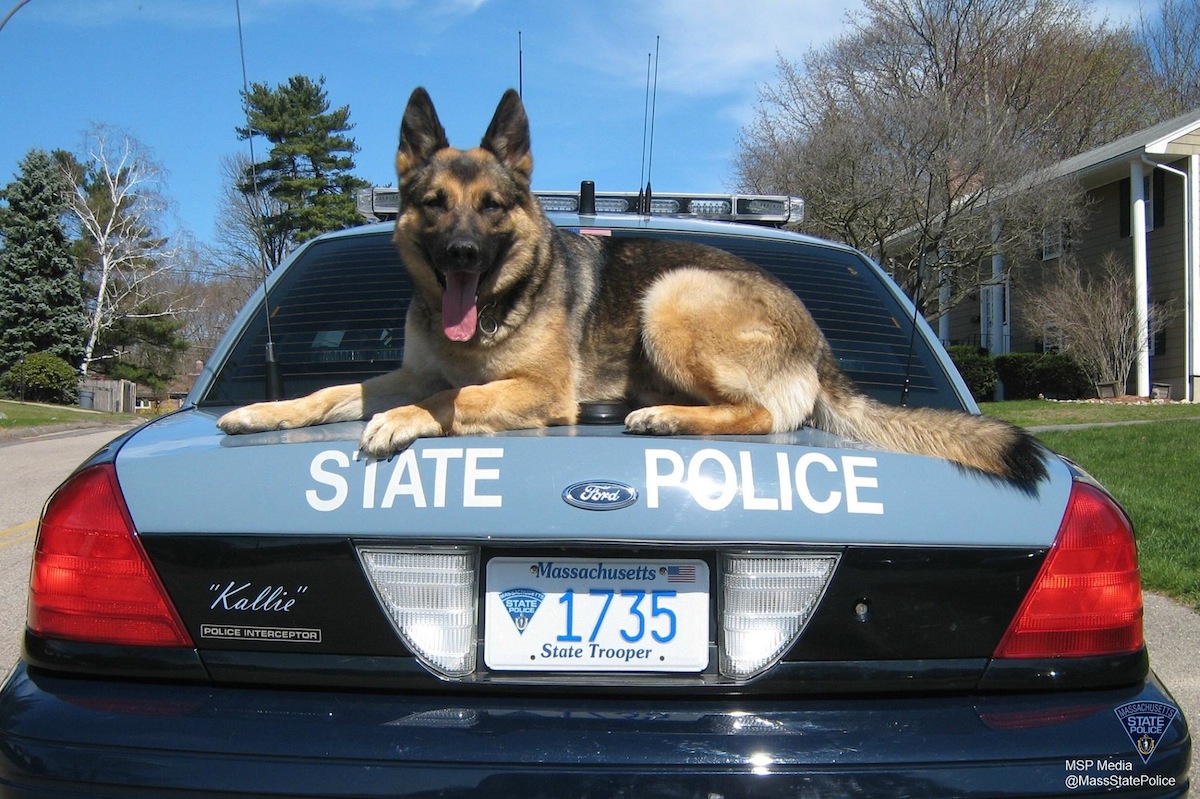State Trooper Pens Heartfelt Letter to Fallen Police Dog

Image courtesy of State Police
Saying goodbye to a pet is hard for anybody that has ever owned one. But when a police officer has to part with his K-9 partner, after spending years together on the job, it’s can seem even tougher.
“It’s tough for officers, it’s really an emotional experience,” said Amesbury Police Officer Tom Nichols, who helps train K-9 officers at a facility in Boston. “To understand the bond between an officer and a dog—it’s a totally different level.”
That much was evident in a heart-wrenching letter that a State Police trooper wrote this week after he had to put down his service dog, Kallie, due to cancer.
In a lengthy post on the Massachusetts State Police’s Facebook page, Lt. Joseph King described his relationship with his on-duty canine companion, who served alongside him for more than seven years as a four-legged narcotics officer.
King said regrettably, he had to put Kallie, 9, down this week due to her deteriorating health, and to prevent her from suffering. “After a second doctor had reviewed Kallie’s case, the opinion was the same: she had cancer, and it was bad. Surgery and chemotherapy were options, but even the most optimistic scenarios only gave her an additional six months to live, and her quality of life during that time would have been very poor,” King wrote. “I didn’t think I could bear to see her labor through pain and discomfort every day for six months, only to die at the end anyway. I decided it was best to just let her go, peacefully and painlessly.”
King’s letter, which was shared on Facebook more than 800 times as of Tuesday afternoon, detailed Kallie’s work in the Commonwealth over the last seven years, which is the typical timeframe for a K-9 to be on the job.
“Kallie tracked and located missing and lost hikers in the woods, fleeing felons, domestic abusers, B&E suspects, shoplifters, and various other types of missing and wanted people,” King said of the arduous work she performed to help make arrests and solve crimes. “She found people hiding in thick bushes, in high weeds, in sheds, in swamps, up on roofs, in crowded bus stations, under overturned kiddie pools in back yards, passed out in drainage ditches along the side of the highway. I went to K-9 calls very confident that if someone was there to be found, Kallie would find him.”
Off the job, Kallie was equally as valuable. King said she was often the canine that was used for demonstrations when meeting young children, and was quiet and close with King’s family. “But when she got in the cruiser with me to go to work it was a whole different story: she was all police dog, eyes open, ears up, and she barked at everybody,” he said.
Kallie’s cancer came as a complete surprise to King, who said the same day that she started to become lethargic due to the two aggressive tumors growing in her body, she had been hard at work, running alongside King as they had done most days for more than half of a decade.
Kallie’s reaction to the cancer was not uncommon. Nichols said he has had similar experiences in his years of work with K-9 officers. One of his first dogs, Hans, who died from lung cancer, got called in for a situation involving an armed gang member just four days before he was put down. He said he was unaware that the dog was even feeling ill. “They are just really stoic about it,” said Nichols. “You would never even know that they’re sick.”


